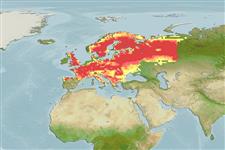Classification / Names
Common names from other countries
Main reference
Size / Weight / Age
Max length : 60.0 cm TL male/unsexed; (Ref. 556); common length : 30.0 cm TL male/unsexed; (Ref. 556); max. published weight: 6.7 kg (Ref. 6368); max. reported age: 14 years (Ref. 556)
Length at first maturity
Lm ? range ? - ? cm
Environment
Freshwater; brackish; benthopelagic; pH range: 7.0 - 7.5; dH range: 20 - ?; non-migratory; depth range 15 - ? m (Ref. 30578)
Climate / Range
Temperate; 6°C - 18°C (Ref. 2059), preferred ?; 70°N - 42°N, 6°W - 66°E
Distribution
Europe: Barent Sea basin west of Urals, Caspian, Black, Baltic, White and North Sea basins, Atlantic westward to Loire drainage; Rhône drainage; northern Adriatic basin east to Soca drainage. Introduced over most of southern and central Finland. Appendix III of the Bern Convention (protected fauna).
Countries | FAO areas | Ecosystems | Occurrences | Introductions
Short description
Dorsal
spines
(total): 5 - 8;
Dorsal
soft rays
(total): 12-17;
Anal
spines: 3-4;
Anal
soft rays: 9 - 10;
Vertebrae: 57 - 61. Distinguished from Thymallus arcticus by the following unique characters: maxillary usually reaching anterior margin of eye; pelvic fin grey, lacking red stripes; body without red spots; dorsal fin greyish, with parallel rows of round dark spots; gill rakers 19-30, averaging about 24-26 (Ref. 59043). Caudal fin with 19 to 21 rays (Ref. 2196).
IUCN Red List Status (Ref. 115185)
Threat to humans
Harmless
Human uses
Fisheries: commercial; aquaculture: commercial; gamefish: yes; aquarium: public aquariums
More information
ReferencesAquacultureAquaculture profileStrainsGeneticsAllele frequenciesHeritabilityDiseasesProcessingMass conversion
Tools
Special reports
Download XML
Internet sources
Estimates of some properties based on models
Phylogenetic diversity index
PD50 = 0.5001 many relatives (e.g. carps) 0.5 - 2.0 few relatives (e.g. lungfishes)
Trophic Level
3.1 ±0.42 se; Based on food items.
Resilience
Medium, minimum population doubling time 1.4 - 4.4 years (K=0.12-0.26; tm=2-6; tmax=14)
Vulnerability
Moderate vulnerability (41 of 100)
Price category
